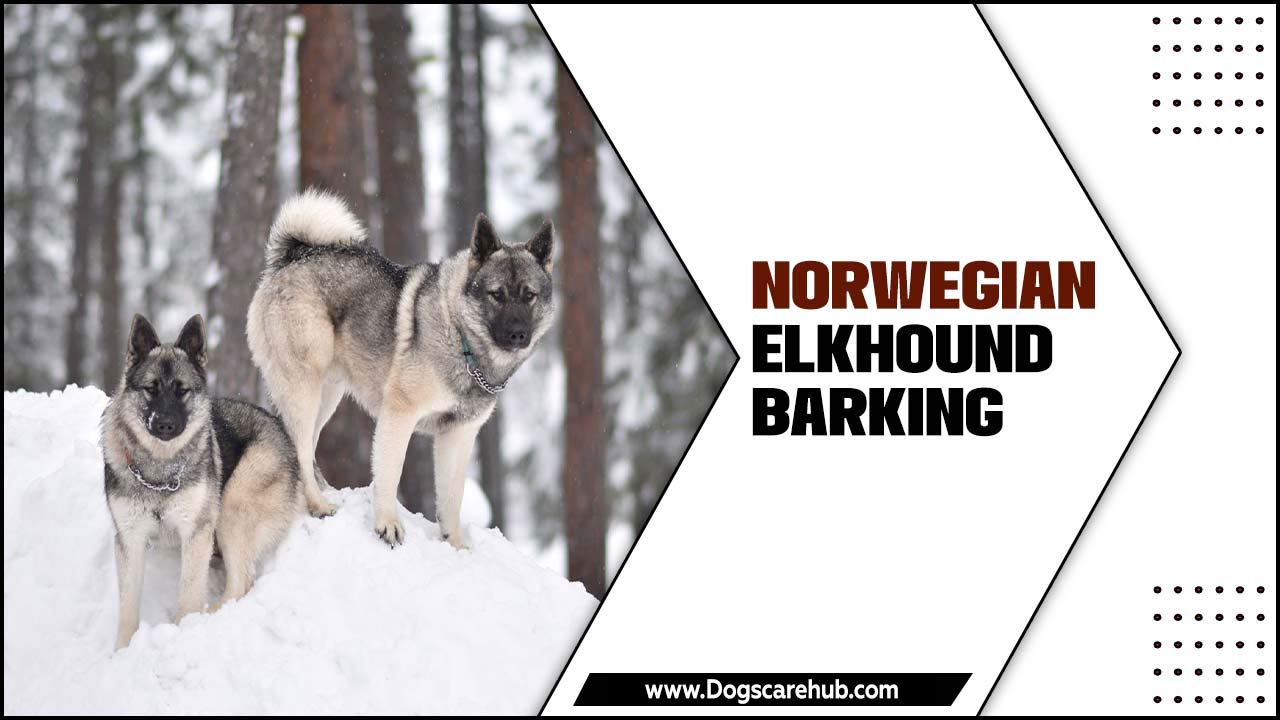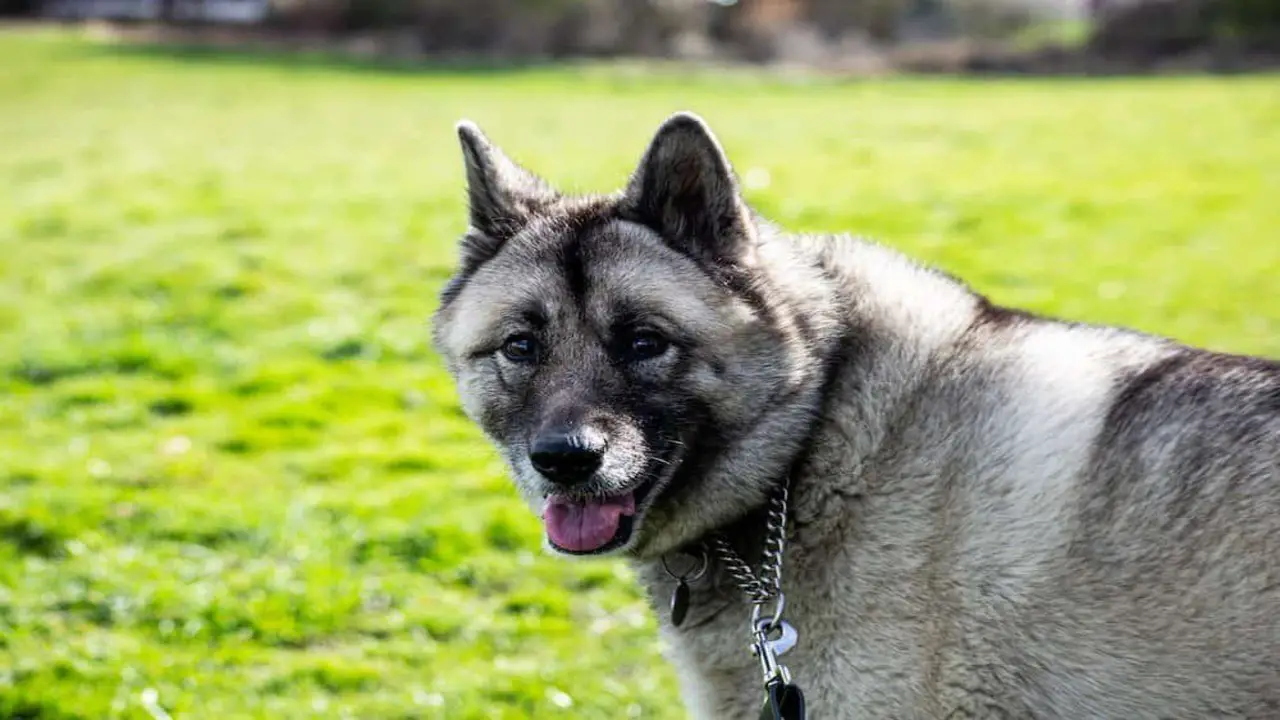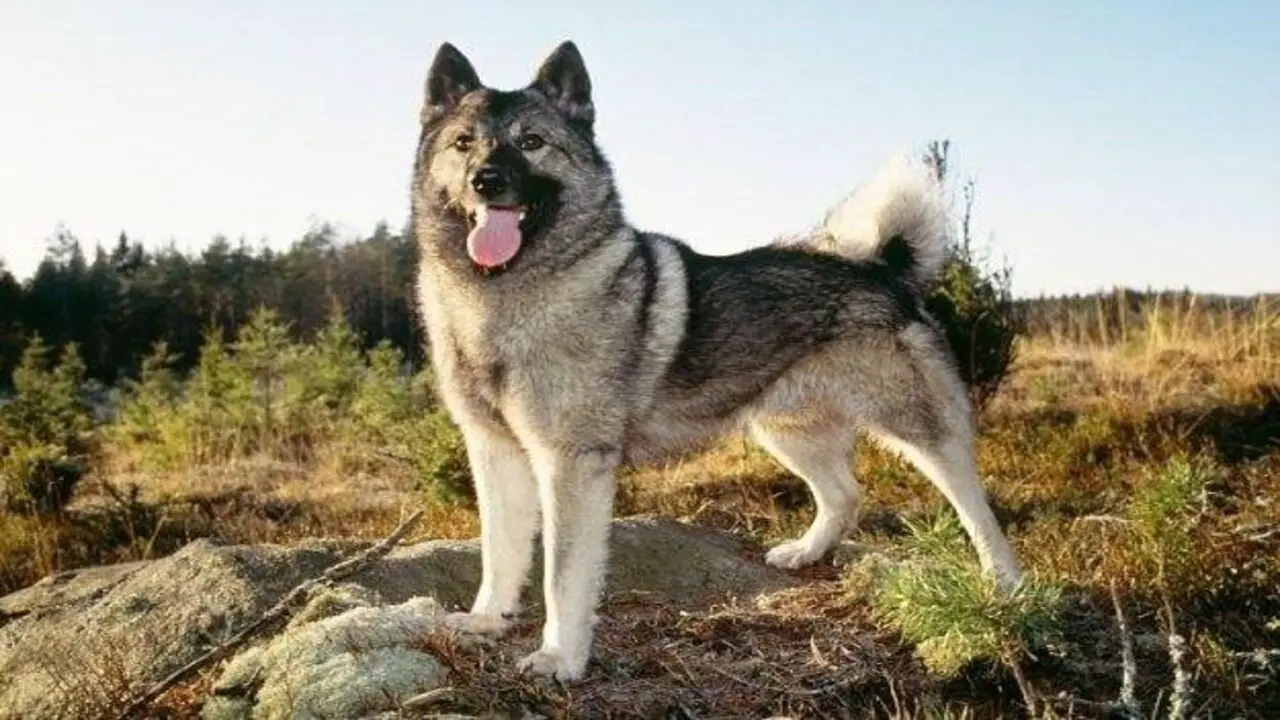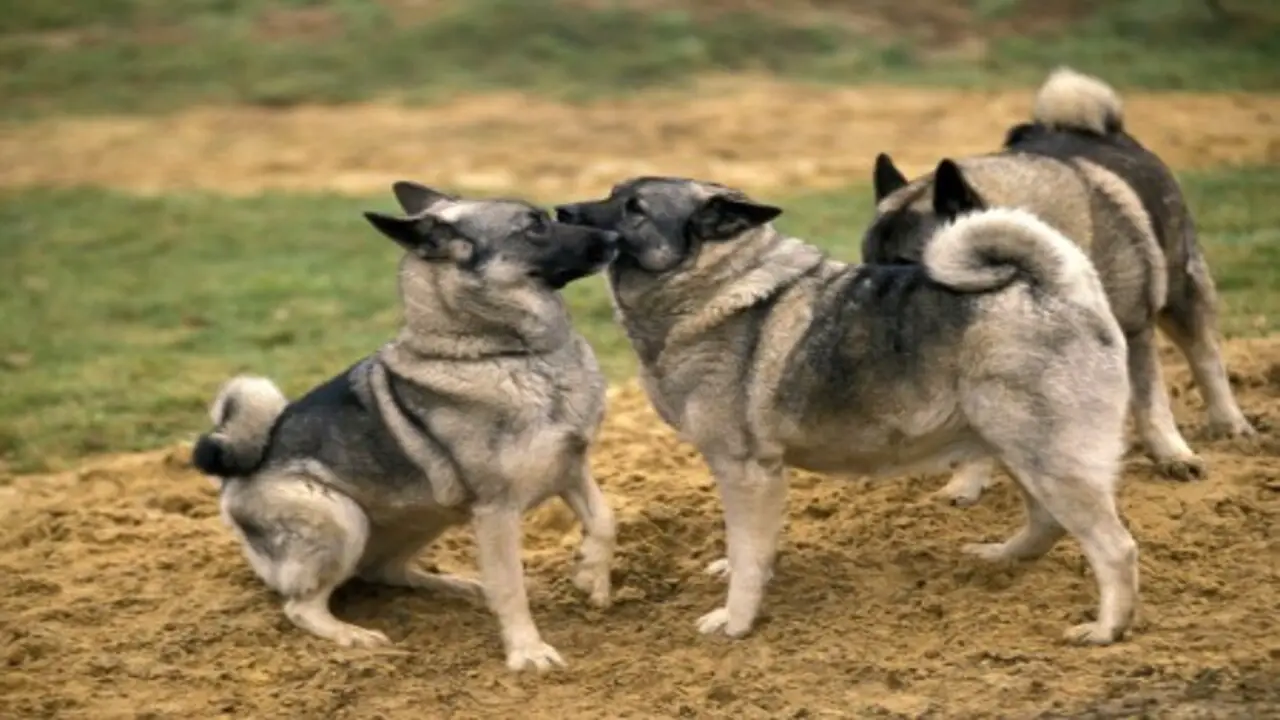The Norwegian dog is a beloved breed among dog lovers worldwide. Its thick, fluffy coat and friendly temperament make it easy to see why so many people adopt a Norwegian dog into their families.
These dogs have a strong work ethic and were originally bred to work alongside their human owners in harsh winter conditions. They are often used as sled dogs or for hunting in the snowy mountains of Norway.
Norwegian Elkhounds are one of the oldest domesticated dog breeds in the world. They have been bred for centuries to hunt moose and other large game in the harsh conditions of the Scandinavian wilderness.
However, despite their long history as working dogs, Norwegian Elkhounds make excellent pets and companions. We’ll discuss Why does my Norwegian elkhound barking. These energetic and loyal dogs are popular for their distinctive bark, which can be both a blessing and a curse for their owners.

Why Does My Norwegian Elkhound Barking More Than Other Dogs? 5 Reasons

The Norwegian Elkhound dog is a breed that has been around for centuries and is popular for its hunting abilities. These dogs are medium-sized and have thick, gray coats that make them look majestic. You have a Norwegian Elkhound, and you’ve noticed that they bark more than other dogs; you might wonder why.
They are highly intelligent and have a strong sense of loyalty towards their owners. If you are wondering why your Norwegian Elkhound barks more than other dogs, several reasons could explain this behavior. Here are Why does my norwegian elkhound barking more than other dogs? 5 reasons:
1. Breed Characteristics
A Norwegian Elkhound owner and wondering why your pooch barks more than other dogs, there are several factors to consider. One of the main reasons is the breed characteristics. Elkhounds are popular for being vocal and making various sounds to communicate with their owners.
They were originally bred to track big game, such as elk and moose, and their barking and howling helped alert their owners to the animal’s location. Additionally, Elkhounds are territorial and protective, so they may bark to ward off perceived threats, including strangers or other animals.
2. Territorial Instincts

Norwegian Elkhounds are popular for their loyalty and protectiveness, which can translate into excessive barking. If you’re wondering why your Norwegian Elkhound barks more than other dogs, there are a few reasons to consider. One of the main reasons is their territorial instincts.
Norwegian Elkhounds were originally bred as hunting dogs, and their protective instincts helped them guard their prey. Today, the breed still exhibits this trait and becomes quite vocal when perceiving a threat to their territory. They might start barking to release their pent-up energy if you don’t mentally stimulate your dog.
3. Separation Anxiety
If you’re wondering why your Norwegian Elkhound barks more than other dogs, separation anxiety could be one of the reasons. This breed is popular for being extremely loyal and attached to their owners, making them prone to separation anxiety.
When left alone for too long, Norwegian Elkhounds may become anxious and restless, leading them to bark excessively. Another reason for their barking could be their protective nature. These dogs were originally bred for hunting and guarding, so it’s unsurprising that they bark at anything they perceive as threatening or dangerous. Additionally, boredom can also be a contributing factor to their excessive barking.
4. Lack Of Exercise
You are wondering why your Norwegian Elkhound is barking more than other dogs, and there could be several reasons behind it. One of the main reasons could be a lack of exercise. Norwegian Elkhounds are a highly active breed; if they are not getting enough physical activity, they tend to become restless and bark excessively. These dogs are popular for their energy and love to run and play, so it is important to ensure sufficient exercise every day.
Another reason behind excessive barking could be boredom. They might start barking to release their pent-up energy if you don’t mentally stimulate your dog. Providing them with chew toys and puzzle games can keep them occupied and mentally stimulated, reducing their barking.
5. Underlying Health Issues

Many dog owners wonder why their Norwegian Elkhound barks more than other dogs. Barking is a natural behavior for dogs; it is how they communicate with their owners and other animals. However, if your Norwegian Elkhound is barking excessively, it could indicate an underlying health issue.
There are several reasons why your dog may be barking excessively, such as separation anxiety, boredom, and territorial behavior. However, if you have ruled out these factors and your dog is still barking more than usual, you may need to consult a veterinarian.
Underlying health issues can cause your dog to bark excessively. For example, if your dog is in pain or discomfort, it may bark to communicate this to you.
Separation Anxiety And How It Affects Barking Behavior
Separation anxiety is a common behavioral problem in dogs that can significantly impact their barking behavior. When left alone, dogs suffering from separation anxiety experience intense fear and distress, which can result in excessive barking. It is crucial to address separation anxiety to help prevent excessive barking and destructive behavior. Owners can work with a professional dog trainer or behaviorist to help their dog overcome separation. Here are some ways separation anxiety affects barking behavior:
- Excessive Barking: Dogs with separation anxiety may bark excessively when left alone, often in a high-pitched, panicked tone.
- Non-Stop Barking: They may bark non-stop for prolonged periods until their owner returns or until they exhaust themselves.
- Howling: Some dogs with separation anxiety may howl instead of barking, which can be just as disruptive and distressing to neighbors.
- Destructive Behavior: Besides barking, dogs with separation anxiety may engage in destructive behavior such as chewing, digging, or scratching.
Environmental Factors That Can Cause Excessive Barking

Excessive barking in dogs can be a problem for pet owners and their neighbors. It is important for pet owners to identify the underlying cause of their dog’s excessive barking to address the issue effectively. This may involve providing more exercise, addressing separation anxiety through behavior modification or medication, and reducing noise. While some barking is natural, certain environmental factors can cause dogs to bark excessively. These factors can include:
- Lack Of Exercise: Dogs that do not get enough physical activity may bark out of boredom or frustration.
- Separation Anxiety: Dogs that feel anxious when left alone may bark excessively to express their distress.
- Noise Pollution: Loud noises, such as construction work or traffic, can trigger barking in dogs.
- Territorial Behavior: Dogs may bark excessively to defend their territory or to alert their owners of perceived threats.
- Lack Of Socialization: Dogs that have not been properly socialized may react to new people or animals by barking excessively.
How To Train Your Norwegian Elkhound To Stop Barking

Training your Norwegian Elkhound to stop barking can be challenging, but it can achieve with patience and consistency. Training your Norwegian Elkhound to stop barking can be challenging, but it is essential to maintain a peaceful household. Here are some bullet points on how to train your dog to stop barking:
- Identify The Reason For Barking: Is your dog barking out of excitement, fear, boredom, or aggression? Understanding the reason for barking can help you address it properly.
- Teach The “Quiet” Command: When your dog starts barking, say “quiet” calmly and firmly. When your dog stops barking, reward them with treats and praise.
- Provide Enough Exercise And Mental Stimulation: A tired and stimulated dog is less likely to bark excessively. Take your dog for walks, play games, and provide toys that can keep them entertained.
- Avoid Reinforcing Barking: If your dog barks for attention, avoid giving them attention when they bark. Wait for them to be quiet before giving them attention.
Conclusion
Dogs are loyal and loving pets that offer companionship and protection to their owners. They are popular for their playful personalities and ability to comfort those around them. Whether it’s playing fetch in the park or cuddling on the couch, dogs bring joy to our lives.
Understanding why your Norwegian Elkhound is barking is important in keeping a peaceful and harmonious environment. From boredom to anxiety, there are several reasons why your furry friend may bark excessively.
As a responsible owner, it is your duty to identify the root cause and take necessary measures to reduce the barking. Remember, barking is a natural behavior for dogs, but excessive barking can become a nuisance. We’ve discussed Why does my norwegian elkhound barking. With patience, training, and proper care, you and your Norwegian Elkhound can live a happy and barking-free life together.
FAQ
1.Do Norwegian Elkhounds Bark A Lot?
Ans: Yes, Norwegian Elkhounds tend to bark a lot. They are bred as hunting dogs and have a strong instinct to alert their owners of any potential prey or danger. However, they can learn to control their barking with proper training and socialization.
2.Which Dog Barks The Lowest?
Ans: The Norwegian Elkhound is popular for its distinctive and deep bark. This breed can also produce a wide range of vocalizations, from growls and howls to barks and whines. While the breed is not excessively vocal, it may bark to alert its owner of potential danger or express excitement.
However, with proper training and socialization, Norwegian Elkhounds can learn to control their barking and only use it when necessary. Overall, the Norwegian Elkhound’s unique bark is one of its defining characteristics, and why many people find this breed so appealing.
3.Does Rottweiler Bark A Lot?
Ans: The Basenji is popular for being a breed of dog that rarely barks, and when it does, its bark is often described as low-pitched or “baron” The Norwegian Elkhound is popular for its distinctive and deep bark. This breed can also produce a wide range of vocalizations, from growls and howls to barks and whines. While the breed is not excessively vocal, it may bark to alert its owner of potential danger or express excitement.
4.Do Dobermans Bark A Lot?
Ans: Yes, Dobermans are popular for barking a lot. They are naturally protective and may bark to warn their owners of threats or strangers. However, their barking can be controlled and minimized with proper training and socialization.
5.Which Is Better, Doberman Or A German Shepherd?
Ans: A Doberman or a German shepherd are both excellent breeds, but each has unique traits and characteristics. Dobermans are larger and more aggressive, while German shepherds are more affectionate and obedient. Choosing between a Doberman or a German shepherd will depend on your specific needs and preferences.
Meet Elyse Colburn, the devoted canine companion and storyteller behind the enchanting world of “Tales, Tails, and Adventures Unleashed.” A passionate dog enthusiast with a heart full of paw prints, Elyse Colburn shares heartwarming tales and insightful adventures, celebrating the joy, loyalty, and endless antics that make every dog a true hero. Join Elyse Colburn on this tail-wagging journey, where every post is a love letter to our four-legged friends.







